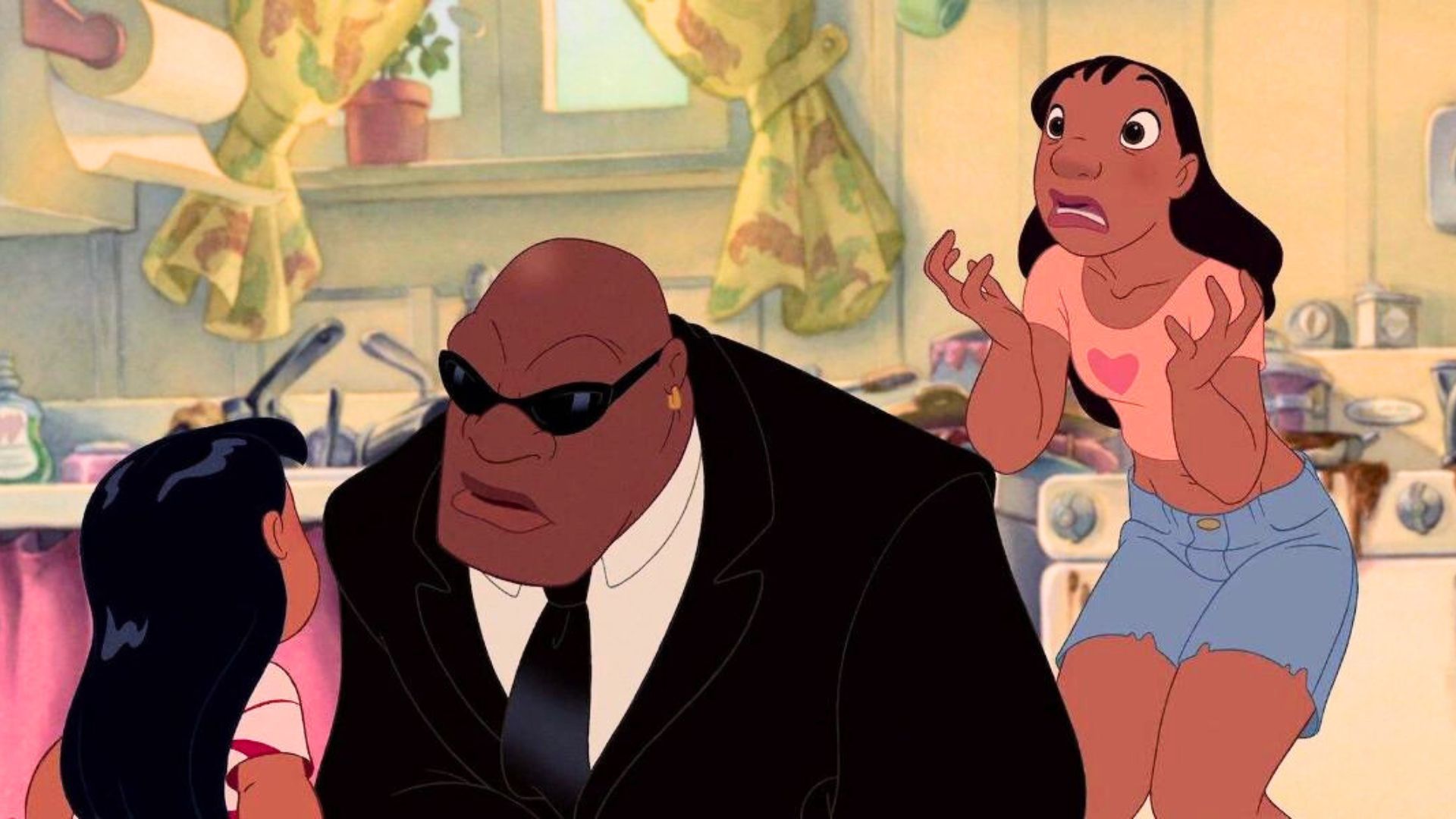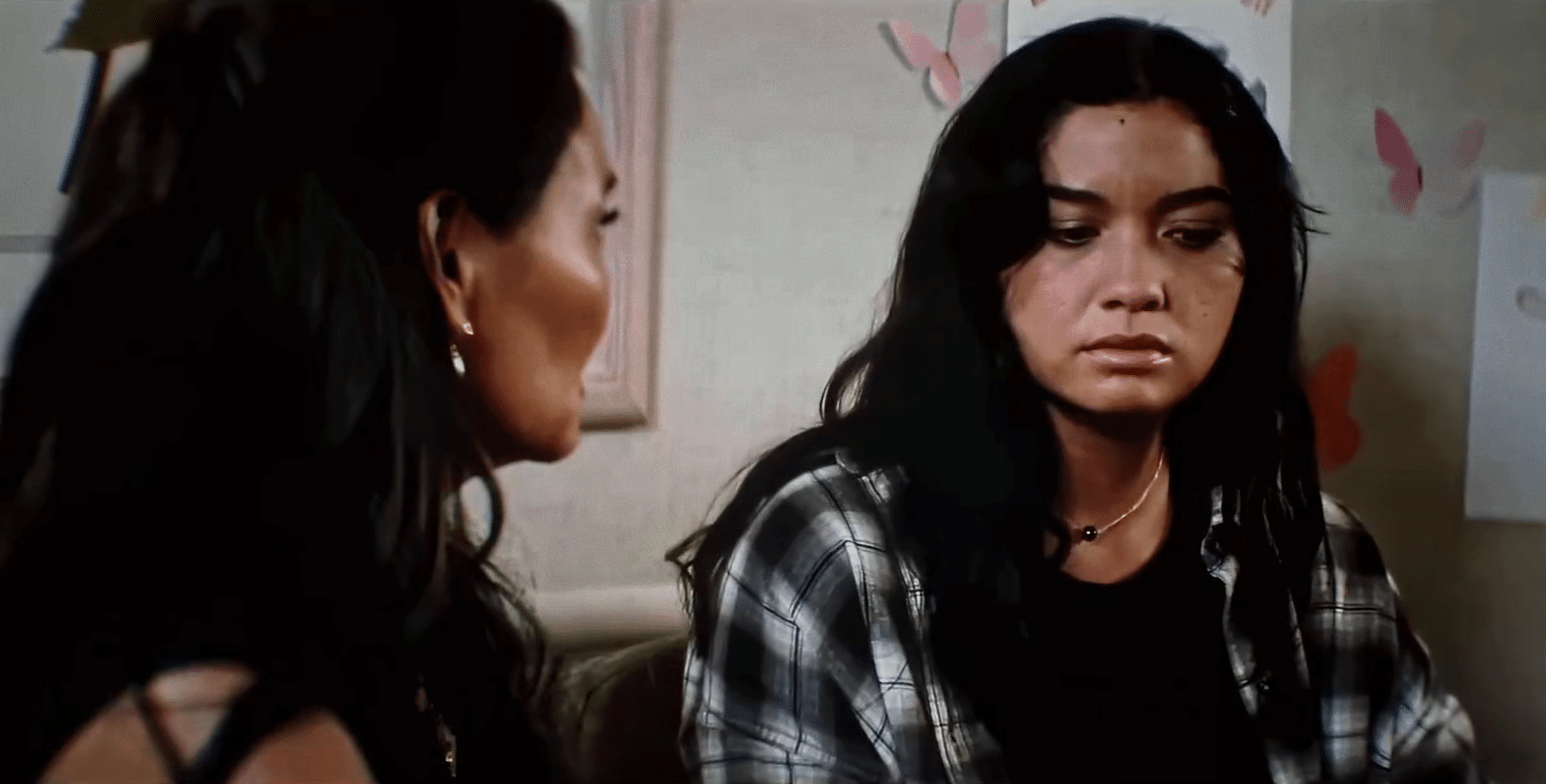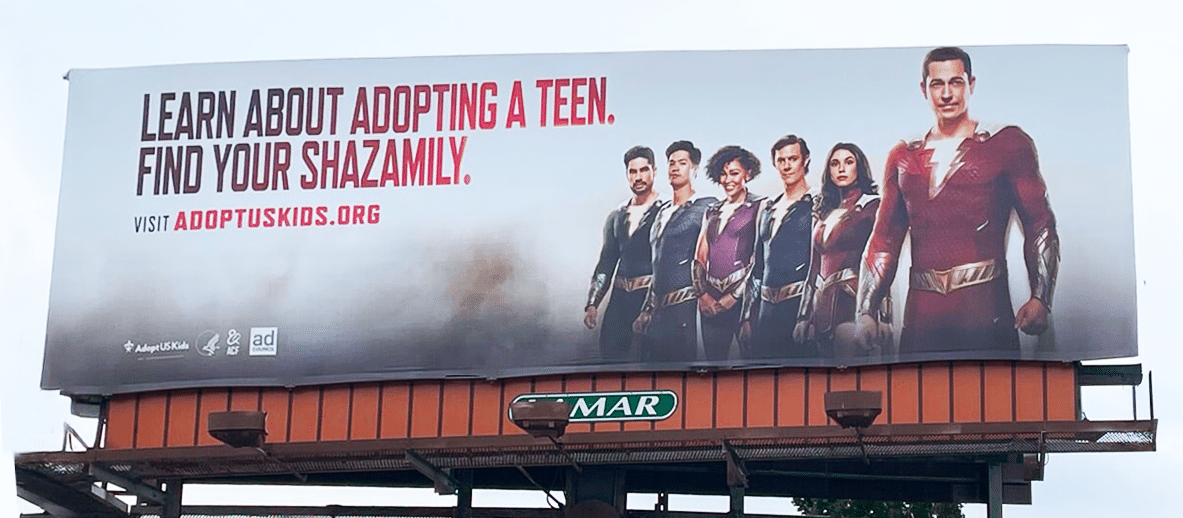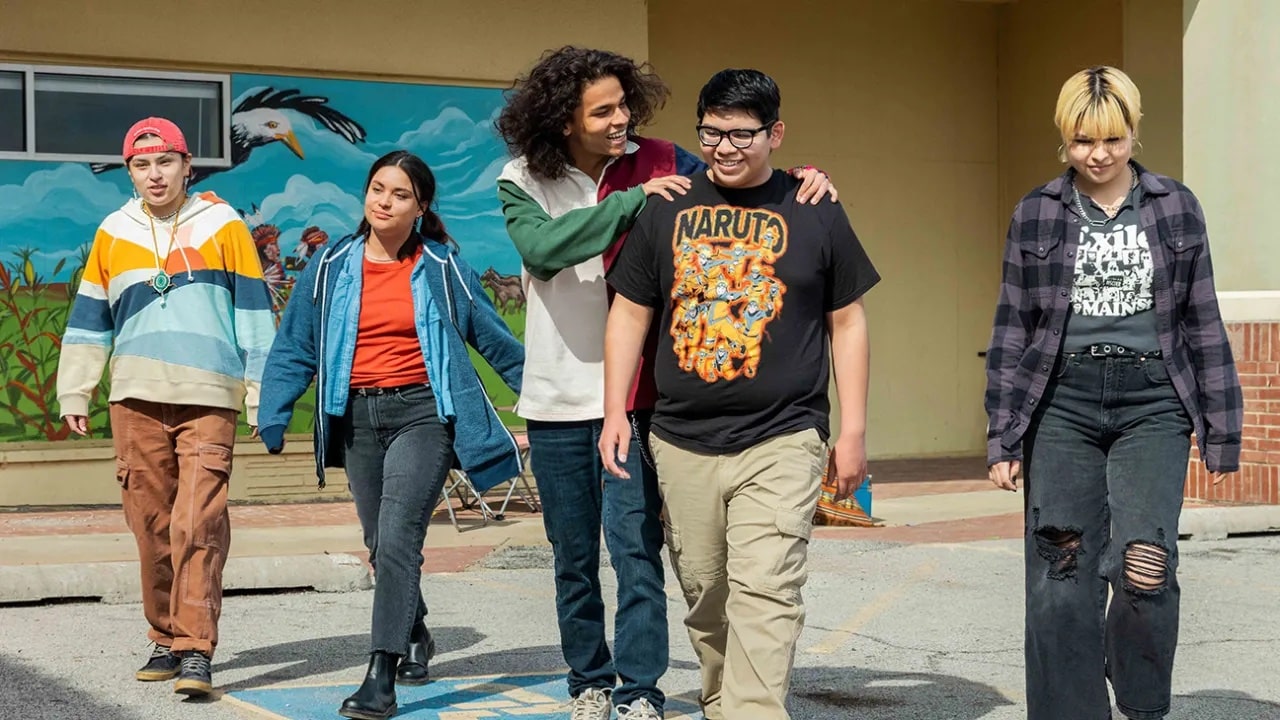Breaking Down Family Policing Copaganda in the New ‘Lilo & Stitch’
June 9, 2025
June 9, 2025

by Sydnie Dan’el Mares
Disney’s latest live-action remake, Lilo and Stitch (2025) grossed $341 million in its opening weekend at the box office. Set in Hawai’i, against the backdrop of violent family separation of Indigenous families by the child welfare system, the film is poised to impact the way millions of people think about family policing and the termination of parental rights.
In the original movie, Stitch is an alien evading the space police and space prison that he has been sentenced to because of his genetic propensity to “destroy.” Stitch meets Lilo, a lonely, imaginative young girl in Hawai’i who is grieving her parents. Nani, Lilo’s older sister, is navigating invasive visits from child protective services and the threat of losing Lilo. The social worker points to dirty dishes in the house and Lilo being home alone as reasons that Nani is unfit to care for her sister. The threat of separation becomes even more dire when Nani loses her job as a waitress at a “fakey luau” for tourists. In the end, Lilo, Stitch, and Nani fight for each other when the space police try to deport and imprison Stitch. Stitch explains that they have made a family that is “broken, but still good.”
The thesis of Lilo and Stitch (2002) is stated explicitly: “Ohana means family, and family means nobody gets left behind or forgotten.”
The beloved film is especially meaningful for Indigenous kids that grew up with Lilo and Nani as Marli Olive Wesley captured in their recent Substack essay:
The original was more than a kids’ movie. It was a story about loss, displacement, and survival. It showed the quiet violence of child separation, the weight of caretaking placed on Native Hawaiian women, and the ache of grief in a land constantly romanticized by outsiders. It gave us a family trying to stay together under the watchful eye of a system that was never built for them. It gave us a Hawaiʻi that wasn’t just beautiful, but complicated, colonized, grieving, and still alive.
Live-action remakes often get flack for changing the original, but Lilo & Stitch (2025) shifts the story in ways that highlight issues within the family policing system. In the new movie, the social worker prescribes Nani a list of things to do in order to keep Lilo, including paying bills, stocking the fridge, and cleaning their house. A new character, Tūtū, Lilo and Nani’s neighbor, remarks that she “never liked that government lady.”

After a surfing accident, Lilo is rushed to the emergency room. Because Lilo does not have health insurance, they cannot pay for the visit. The social worker is called and says that the government can take care of Lilo’s health costs and urges Nani to “think of what’s best for Lilo” by relinquishing guardianship of her.
The remake ends with Nani leaving for college on the mainland to follow her dream of becoming a marine biologist and signing away her parental rights to the state under the condition that their neighbor Tūtū will foster Lilo. Tūtū goes from distrusting the social worker to collaborating with her, saving the family by legally severing them, and we are to believe that this is a happy ending.
In real life, the termination of parental rights is referred to as the “family death penalty” because it is so violent. Some parents are pressured to sign agreements like the one in Lilo and Stitch (2025) with the expectation that a family member or friend will be able to foster their kids, then they later find out that social workers and judges have the authority to place their kids with a stranger, move them to another state, or prevent any contact completely.
Ashley Albert, founder of Stolen Children’s Month, talks about how signing adoption papers for her kids was traumatic and coercive, like the plea deals forced on those in the criminal legal system. Thankfully, after several years, Ashley was able to recover her kids from the system, but damage has been done to their mental health and relationships that is an ongoing struggle for the Albert family.
Art is powerful because it shapes our worldview and who we see as heroes and villains. In this case, it reframes punishment and surveillance as a happy ending. Media conglomerates like Disney have the funds to shape our views on a societal level, to create myths on a massive scale by contributing to pro-policing propaganda—or copaganda.
In the book Copaganda, Alec Karakatsanis describes the phenomenon like this.
Copaganda is part of a deeper project of preserving the way things are and making us all okay with it. It turns things about our society that should shock us to the core into things we do not even notice, into things we meet with a million isolated shrugs and a sense of helplessness, or, perhaps in the end, into things we celebrate and crave like fiends.
While Karakatsanis is speaking about how the news media covers policing, the same idea applies to fictional works that insist family policing makes kids safer.
We know that a corporation like Disney could never be a true ally to liberation, but the picture gets darker when considering that the Boycott Divestment Sanctions movement for a Free Palestine names Disney as a pressure target because of their connections with the U.S. military and their promotion of an Israeli superhero.
The family policing system may not have funded Lilo and Stitch (2025) in the same way that the U.S. military collaborates on Marvel movies, but Disney does own a resort on Hawaii that heavily features the character Stitch and contributes to a tourism-induced housing crisis on the island. In the Journal of Public Child Welfare, Abram J. Lyons & Claudette Grinnell-Davis connect these dots between colonialism and the impact of the child welfare system on Indigenous children.
Land acquisition has been a defining factor in the evolving relationship between the US and Indigenous Peoples since Europeans first began settling on Turtle Island. While the transition from the boarding school era to the child welfare system may not be explicitly linked to land acquisition, as earlier US-Indigenous policies were, it nonetheless supports this historical objective.
So it’s not a stretch to suggest that Disney has an incentive to promote settler colonial ideals and normalize the intervention of the state in Indigenous families’ lives.

What people believe about adoption and foster care is largely shaped by what we see on screen. If you grew up watching Annie (1982, 1999, or 2014), you might think that child welfare systems are underfunded and problematic but that we just need enough good foster parents to step in and save the day. The truth is, foster care does not keep children safe.
Oscar-winning film The Blind Side (2009) is one of the most infamous of Hollywood myth-making works regarding child welfare, but there has been new and notable examples in recent years. The National Adoption Association provided instructions for the use of the movie Instant Family (2018) as a “useful tool in your child welfare system’s approaches for recruiting, developing, and supporting families.” They also partnered with Shazam! (2019) and its sequel to run pro-adoption campaigns.
Last year, Sound of Hope: The Story of Possum Trot (2024) didn’t have the reach of the other big-budget films, but it made its rounds in conservative Christian circles and is based on a true story of a Black community in East Texas. The Christian Alliance for Adoption is one of many organizations that created mobilization guides for hosting screenings and beginning foster parent recruitment. This film may be the most insidious example of copaganda because it attempts to circumvent criticisms of white saviorism by using the voices of Black foster parents to reinforce the very system that tears Black families apart.
Even if all foster parents were “good,” the irreparable trauma of family separations would still disproportionately harm Black and Indigenous children because these systems were born of slavery, settler colonialism, and white supremacy. Family policing abolitionists understand that this system needs to be dismantled so that we can build new ways of supporting kids within their own communities, without the threat of forcible separations.
We can enjoy fictional stories, even imperfect ones. But we should reckon with the difference between the reality of family policing and the multi-million dollar myths that are presented to us by Hollywood. After we’ve identified potential family policing copaganda, we should ask who benefits financially or politically from this story being told in this way. What carceral logics are being normalized? Which marginalized voices are being left out of the production or the narrative?
In Stitch (2025), Nani is presented with two options: release custody of Lilo or be an unfit guardian who cannot provide for her well-being. Resisting family policing copaganda means that we should always be imagining about a third, fourth, or fifth option.
What path would preserve ohana? What trusted adults in Lilo’s life would she like to be a part of her support system, and how could an informal agreement be made without the family policing system? What ideas would repair colonial harms and invest in Indigenous community autonomy? How could direct support like guaranteed housing and healthcare help Lilo’s family process their grief instead of punishing them?
When we are given binary, state-driven solutions to complex interpersonal problems, we should stay curious and compassionate, and we should learn from our ancestors who tended to their kids communally— without family policing intervention or in spite of it. And we should join a long history of abolitionists who put their stories on paper and in front of a camera to defy propaganda, document their struggles, and speak the truth.

The following is a non-exhaustive list of films and shows for people who want to see family policing depicted more accurately on screen.
Reservation Dogs (2021-2023) – This dramatic comedy series is helmed by Indigenous creators Sterlin Harjo and Taika Waititi. It follows Indigenous youth in Oklahoma as they navigate grief, community, and the intergenerational legacy of colonization and boarding schools in their community. Reservation Dogs is a history lesson, a genuinely fun time, and a vision of what real community can look like.
Earth Mama (2023) – Written, directed and produced by Savanah Leaf, this film follows a pregnant mother trying to connect with her kids that have been stolen by foster care. She is forced to take parenting classes and is pressured by social workers to consider adoption. There are so many moments in this film that expertly illustrate how the “help” offered by the family policing system is actually violence.
A Thousand and One (2023) – Written and directed by A.V. Rockwell and starring Teyana Taylor, this film follows a mother and son who start a new life after evading the family policing system. If social workers and foster care were the answer to poverty and everyday familial struggles, they wouldn’t be the looming terror over this heartfelt narrative.
To Be Invisible (2024) – This short documentary follows Alexis and Kellie as they stand outside Durham County’s child welfare agency, demanding the return of their children. They partner with Amanda Wallace of Operation Stop CPS to bring their children home.
A Vision of Grace (2025) – I have to mention the short documentary that I directed for upEND Movement, produced by Josie Pickens and filmed and edited by Teylor Bonner. We spent a year getting to know the leaders behind Youth Voiced Empowered that are building community and queer chosen family in Houston, TX. They were so gracious to invite us into their space to create art, discuss music and fashion, and to bravely share their stories on camera. I hope you’ll join us for an upcoming screening.
Sydnie Dan’el Mares is an artist, director, and communicator committed to supporting and uplifting marginalized communities through abolition. Sydnie uses her work to build a future free of carceral systems where Black, LGBTQ, and immigrant communities can thrive.